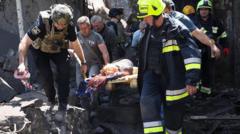President Trump's displeasure with both Iran and Israel over ceasefire violations highlights the ongoing volatility in the region, as missile strikes continue on both sides despite a brokered truce, raising concerns over the durability of the peace agreement.
Fragile Ceasefire in Middle East: Trump Criticizes Both Israel and Iran Amid Ongoing Violence

Fragile Ceasefire in Middle East: Trump Criticizes Both Israel and Iran Amid Ongoing Violence
Tensions escalate as President Trump lambasts Iran and Israel for resuming attacks despite a newly announced ceasefire, illuminating the precarious nature of the agreement.
June 24, 2025, 12:11 p.m. ET
President Trump expressed strong dissatisfaction on Tuesday with both Israel and Iran for launching attacks shortly after announcing a ceasefire, suggesting that the fragile peace agreement could be at risk. In remarks riddled with frustrated expletives, Trump criticized Israel for retaliating against Iran “right after we made the deal,” indicating his frustration with both nations, whom he noted were entangled in a historic conflict.
The backdrop to these developments includes a missile strike by Iran that resulted in casualties in Beersheba, Israel. The Iranian government, while denying violations, asserted that their retaliatory attacks were conducted right before the ceasefire began, claiming they had to respond to Israeli provocations. Meanwhile, Israeli forces responded to Iranian missile fire with targeted strikes, however, these responses appeared to be more restrained than prior strikes, presumably to prevent further escalation.
Trump's engagement in the situation continued as he departed for a NATO summit, wherein he hoped to highlight the ceasefire as a diplomatic achievement, even amid doubts about its effectiveness. Global leaders greeted the ceasefire cautiously, given the complex dynamics at play, as immediate reactions indicated a blend of hope and skepticism surrounding the long-term resolution.
A significant player in this scenario has been Qatar, which reportedly facilitated communication between the parties, effectively brokering the ceasefire. The agreement reflects the delicate balance of power in the region, with continuing fears of escalation after years of hostility that have seen rising violence and geopolitical destabilization.
Despite the diplomatic attempts and public proclamations of peace, reports from both officials and residents indicate that combat activities persisted, echoing worries about the stability of the ceasefire. As the world watches closely, the region remains tense, with the undercurrents of conflict furiously present beneath the veneer of negotiations.
President Trump expressed strong dissatisfaction on Tuesday with both Israel and Iran for launching attacks shortly after announcing a ceasefire, suggesting that the fragile peace agreement could be at risk. In remarks riddled with frustrated expletives, Trump criticized Israel for retaliating against Iran “right after we made the deal,” indicating his frustration with both nations, whom he noted were entangled in a historic conflict.
The backdrop to these developments includes a missile strike by Iran that resulted in casualties in Beersheba, Israel. The Iranian government, while denying violations, asserted that their retaliatory attacks were conducted right before the ceasefire began, claiming they had to respond to Israeli provocations. Meanwhile, Israeli forces responded to Iranian missile fire with targeted strikes, however, these responses appeared to be more restrained than prior strikes, presumably to prevent further escalation.
Trump's engagement in the situation continued as he departed for a NATO summit, wherein he hoped to highlight the ceasefire as a diplomatic achievement, even amid doubts about its effectiveness. Global leaders greeted the ceasefire cautiously, given the complex dynamics at play, as immediate reactions indicated a blend of hope and skepticism surrounding the long-term resolution.
A significant player in this scenario has been Qatar, which reportedly facilitated communication between the parties, effectively brokering the ceasefire. The agreement reflects the delicate balance of power in the region, with continuing fears of escalation after years of hostility that have seen rising violence and geopolitical destabilization.
Despite the diplomatic attempts and public proclamations of peace, reports from both officials and residents indicate that combat activities persisted, echoing worries about the stability of the ceasefire. As the world watches closely, the region remains tense, with the undercurrents of conflict furiously present beneath the veneer of negotiations.























